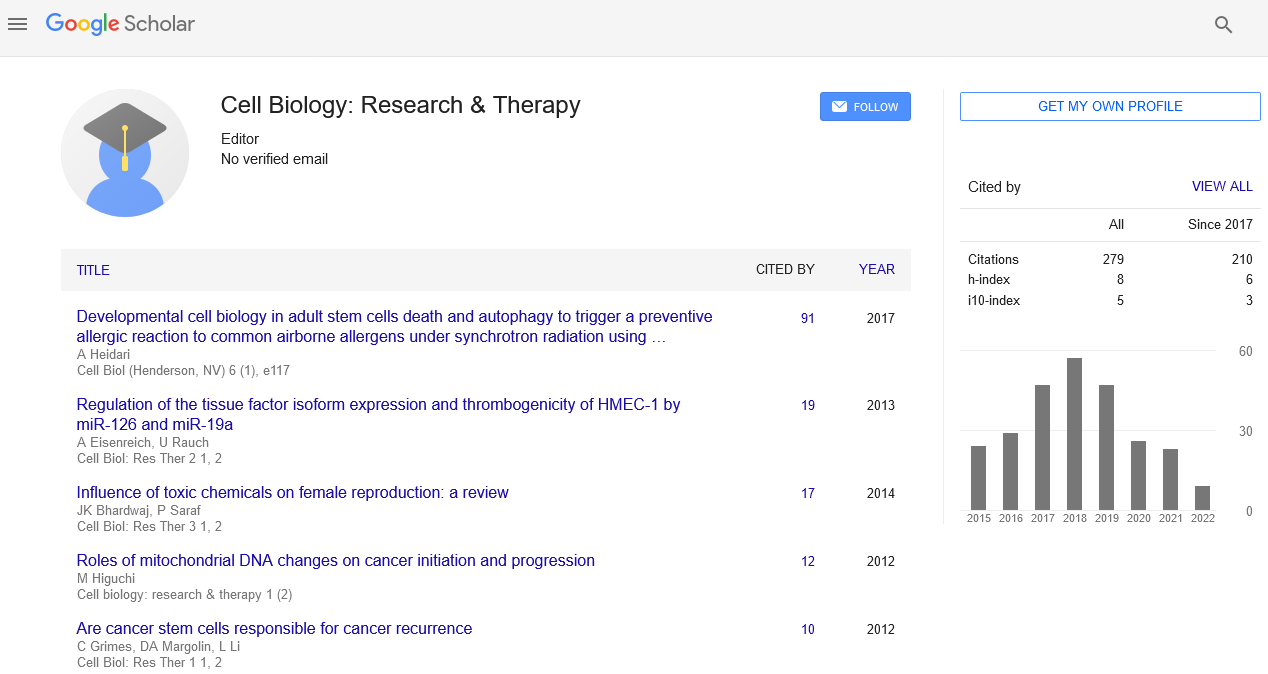Opinion Article, Cell Biol Vol: 12 Issue: 1
Cell Cycle Regulation and Immune Checkpoint Inhibitors in Cancer Therapy
Elena Kenneth*
1Department of Biology, University of North Carolina at Chapel Hill, Chapel Hill, USA
*Corresponding Author: Elena Kenneth
Department of Biology, University of
North Carolina at Chapel Hill, Chapel Hill, USA;
E-mail: kennethe@uonc.edu
Received date: 21 February, 2023, Manuscript No. CBRT-23-95182;
Editor assigned date: 23 February, 2023, Pre QC No. CBRT-23-95182(PQ);
Reviewed date: 07 March, 2023, QC No. CBRT-23-95182;
Revised date: 14 March, 2023, Manuscript No. CBRT-23-95182(R);
Published date: 24 March, 2023, DOI: 10.4172/2324-9293.1000170
Citation: Kenneth E (2023) Cell Cycle Regulation and Immune Checkpoint Inhibitors in Cancer Therapy. Cell Biol 2023 12:1.
Description
The immune system plays an important role in recognizing and eliminating abnormal cells, including cancer cells. However, cancer cells have developed various mechanisms to evade the immune system, including down regulation of immune checkpoint molecules. Immune Checkpoint Inhibitors (ICIs) are a novel class of cancer therapeutics that targets these Checkpoint Molecules to restore the anti-tumor immune response.
The cell cycle is a strongly regulated process that controls cell division and is essential for normal tissue growth and repair. Dysregulation of the cell cycle is a hallmark of cancer, and targeting cell cycle regulators has been an attractive strategy for cancer therapy. Recent studies have revealed a link between cell cycle regulation and immune checkpoint molecules, providing a new perspective on the mechanism of action of ICIs.
ICIs, such as anti-programmed cell Death Protein 1 (PD-1) and Anti-Cytotoxic T-Lymphocyte-Associated Protein 4 (CTLA-4) antibodies block the interaction between immune checkpoint molecules and their ligands, thereby unleashing the anti-tumor immune response. PD-1 is expressed on activated T cells, and its ligands PD-L1 and PD-L2 are expressed on cancer cells and other immune cells. CTLA-4 is expressed on T cells and competes with the co-stimulatory molecule CD28 for binding to its ligands CD80 and CD86 on Antigen-Presenting Cells (APCs). By blocking the interaction between PD-1/PD-L1 and CTLA-4/CD80-CD86, ICIs enhance T cell activation and proliferation, leading to the elimination of cancer cells.
Recent studies have demonstrated a link between cell cycle regulation and the expression of immune checkpoint molecules. For example, the expression of PD-L1 is regulated by the cell cycle protein E2F1, which is activated in response to DNA damage and promotes cell cycle progression. Inhibition of E2F1 or downstream cell cycle regulators, such as Cyclin-Dependent Kinase 4/6 (CDK4/6), reduces PD-L1 expression and enhances the anti-tumor immune response. Similarly, the expression of CTLA-4 is regulated by the cell cycle protein FoxM1, which promotes T cell activation and proliferation. Inhibition of FoxM1 reduces CTLA-4 expression and enhances the efficacy of ICIs.
The cell cycle also plays a role in the efficacy of ICIs. T cells undergo multiple rounds of division upon activation, and cell cycle progression is required for the acquisition of effector functions, such as cytokine production and cytotoxicity. CDK4/6 inhibitors have been shown to enhance the efficacy of ICIs by promoting T cell activation and proliferation. In addition, the expression of immune checkpoint molecules on cancer cells is also influenced by the cell cycle. For example, PD-L1 expression is up regulated in the G1 phase of the cell cycle and down regulated in the S phase, suggesting that targeting cell cycle regulators could modulate the expression of immune checkpoint molecules on cancer cells.
The combination of ICIs with cell cycle inhibitors has shown promising results in preclinical and clinical studies. CDK4/6 inhibitors, such as palbociclib and ribociclib, have been shown to enhance the efficacy of anti-PD-1 therapy in mouse models of melanoma and breast cancer. In addition, the combination of CDK4/6 inhibitors with anti-PD-1 therapy has shown clinical activity in patients with metastatic breast cancer.
Conclusion
In conclusion, the cell cycle is strongly regulated to ensure proper cell division and maintain genomic integrity. Dysregulation of the cell cycle is a hallmark of cancer, and targeting cell cycle checkpoints has been a promising approach for cancer therapy. However, the success of cell cycle inhibitors is limited due to the development of resistance and toxic side effects.
Immune checkpoint inhibitors have emerged as a revolutionary approach for cancer therapy, which harnesses the body's immune system to fight cancer. These inhibitors block negative regulators of T cell activation, such as CTLA-4 and PD-1, leading to the activation of T cells and destruction of cancer cells. Although immune checkpoint inhibitors have shown remarkable success in certain types of cancer, they are not effective in all patients and can cause autoimmune side effects.
 Spanish
Spanish  Chinese
Chinese  Russian
Russian  German
German  French
French  Japanese
Japanese  Portuguese
Portuguese  Hindi
Hindi 